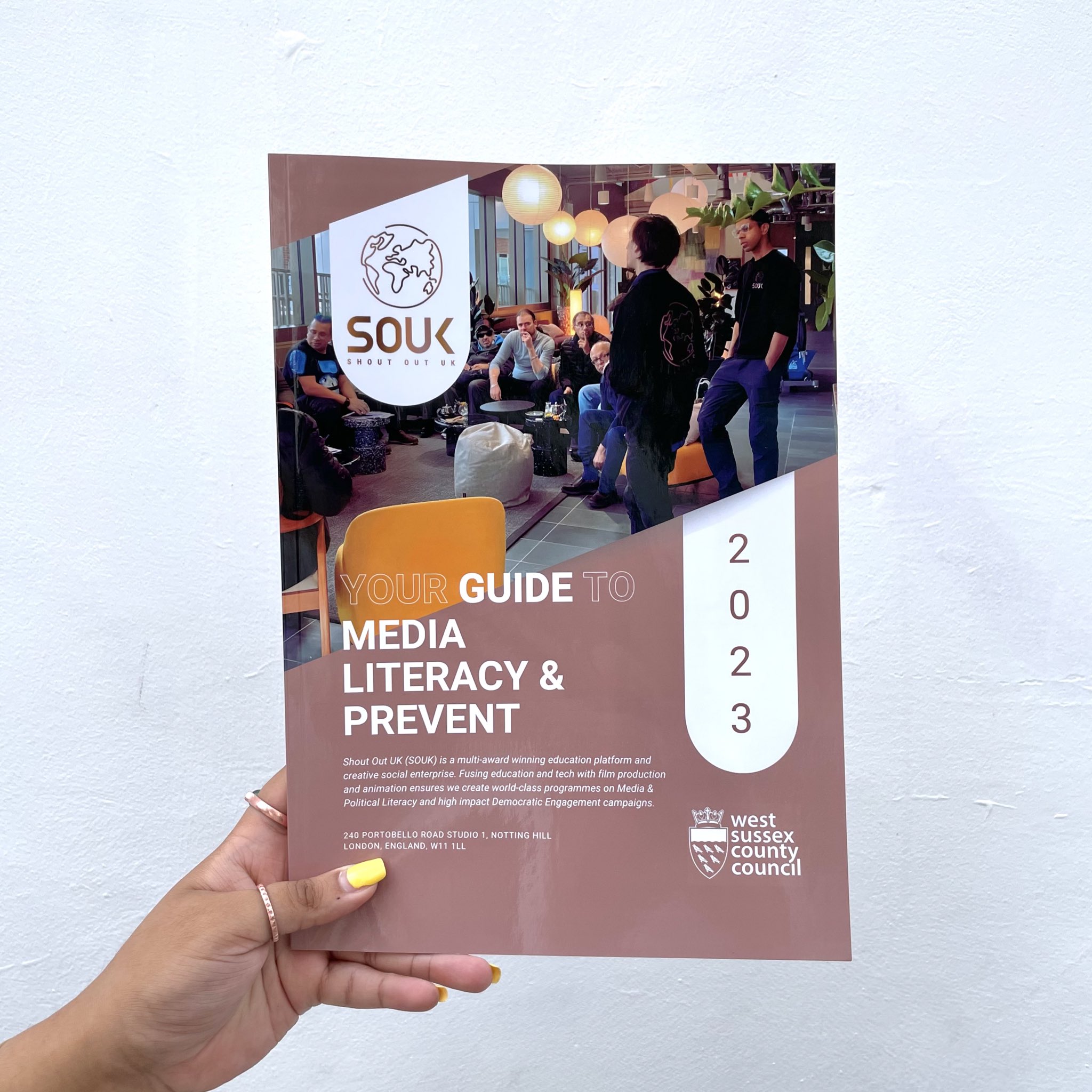Preventing and Countering Violent Extremism (PCVE) Through Media Literacy
“It has been great working with the SOUK team. They know their stuff and keen to engage with young people of all ages and are not afraid to discuss things that need to be said. Their team are knowledgeable and relatable to the groups present to and feel more of their work needs to be seen across schools and colleges.” – Neil Taylor, Young Barnet Foundation
‘Thank you all so much for such a fantastic day on Friday. Feedback from everyone (students, parents, teachers and support staff!) has been exceptionally positive and the students clearly got a huge amount out of the sessions. All the facilitators were great – it is definitely a challenge delivering sessions remotely, however, the students were clearly engaged and thoroughly enjoyed the session. Thank you again for everything – you are all brilliant!’ – Eli Samuels, Hammersmith Academy
‘KS2 pupils actively engaged in all three sessions and said they really enjoyed the learning. When pupils were asked what they had learned this week in assembly, one pupil recapped what he had learned about extremism!’ – Daniela Caton, Courtyard AP Academy (Primary PRU)
‘Shout Out UK is the first organisation to provide training like this in Rotherham. Having worked here for 15 years I have never attended a training that has showcased young people’s social media like this. I found the information very relevant to my own experiences with safeguarding young people and referring them to the Channel. I am very keen to keep a relationship with Shout Out UK.’ – Teacher and Chair of Designated Safeguarding Leads
‘The training was really good. I enjoyed it. It has definitely increased my awareness of radicalisation.’ – Youth Worker, Bernardos
Our Approach
Shout Out UK is a modern solutions-driven education provider which employs media literacy to disrupt disinformation by malicious actors and protect audiences online.
Prevent Duty: Adapting to new updates
In the year ending 31 March 2023, of the 6,809 referrals to Prevent where the type of concern is specified, 37% were for individuals with `vulnerability present but no ideology or CT risk’. Referrals due to Extreme Right-Wing concerns (19%) accounted for the second highest proportion, followed by referrals regarding conflicted ideology (18%). 11% of referrals were due to concerns regarding Islamist ideology.
For the third year running, the number of referrals for Extreme Right-Wing concerns (1,310; 19%) is greater than referrals for Islamist concerns (781; 11%). Referrals for individuals with a ‘vulnerability present but no ideology or CT risk’ have increased year-on-year since the year ending 31 March 2020. This type of concern accounted for 25% of referrals in 2019/20, 33% of referrals in 2020/21, 33% of referrals in 2021/22, and 37% of referrals this year (Home Office: Official Statistics, ‘Individuals referred to and supported through the Prevent Programme, April 2022 to March 2023’ Published December 7th, 2023).
Shout Out UK’s interventions are suited to address the updates reflected in statistical evidence and policy recommendations to schools. Our interventions focus on building resilience to the techniques and methods utilised by extremist actors to spread Far-Right/Left, Extreme Islamist and Mixed, Unclear and Unstable (MUU) ideologies.
The above risks currently represent over half of all Prevent referrals, and we understand schools will be concerned with how to approach these risks. Teaching media literacy ensures that all those impacted by our programmes leave with life-long tools and skills to safeguard themselves from these threats.
Our services
In response to the increasing proliferation of mis/disinformation online, as well as an uptick in Mixed, Unclear and Unstable (MUU) ideologies across social media platforms, Shout Out UK has designed a Media Literacy Programme for students, as well as a Train-the-Trainer (CPD) Media Literacy programme for teachers, youth workers and other safeguarding officials.
These programmes empower both young people and frontline professionals with the necessary skills to navigate 21st-century challenges and foster resilience among themselves and their peers against the allure of online radicalisation and extremism.

Youth programme
This programme aims to equip young people with the necessary research and critical thinking skills required to tackle disinformation, misinformation and extremism online. Students will leave the session with a thorough comprehension of core Media Literacy related terms and concepts, such as:
- Dis, Mis and Mal Information, including the ability to identify them.
- Science Literacy: Uncovering the science behind narratives on pandemics, abortion, identity and race.
- Extreme Misogyny and the Manosphere (e.g. Andrew Tate).
- Deep Fakes: Understanding how this emerging technology influences the way in which news is interpreted.
- AI and Emerging Technology: Learning how new technologies are being used in disinformation campaigns / attacks.
- The digital trafficking of people’s virtual likeness.
These are examples of some of the topics we cover, but if you have any specific topics you would like us to discuss during the training, we can tailor the programme’s content to your students and your area’s local context (including language translation when required).
Train-the-trainer programme (CPD)
Our Train-the-trainer programme closely follows that of our student programme. The aim of our training is to equip professionals with both the skills and the confidence to apply practical Media Literacy teaching to a variety of educational settings, which can then be integrated into their practices and ultimately passed on to the young people they interact with to safeguard them and build their resilience to online radicalisation.
The transferable and sustainable skills you will develop during the session will enable you to tackle the constantly-evolving nature of online radicalisation.
If you would like to tailor the programme to your needs and requirements, we are happy to accommodate. For instance, others have asked for the following:
- Support in the prevent referral process, including the channel process.
- Tackling Controversial Issues: How to frame debates and discussions.
- Translation into Welsh, Russian and Romanian.
- Localising examples used in materials.

Want To Learn More?







